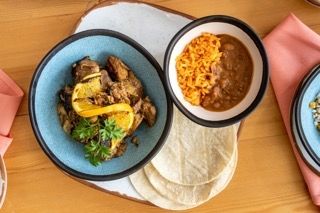Learn why mexican food remains beloved worldwide among food enthusiasts
Is Mexican Food Healthy? Unpacking the Nutritional Benefits of Conventional Ingredients
The inquiry of whether Mexican food is healthy welcomes an exploration of its typical components. Beans and corn work as fundamental staples, abundant in healthy protein and fiber. Avocados provide valuable fats, while different natural herbs and seasonings include flavor and health advantages - happy hour. With each other, these elements develop a tapestry of nourishment. Nonetheless, the healthfulness of Mexican food often relies on preparation approaches and portion dimensions. What function do these factors play in identifying its general dietary worth?
The Power of Beans: Protein and Fiber-Rich Staples
Typically ignored, beans offer as a keystone of Mexican food, supplying a wide range of dietary advantages. Rich in healthy protein, they are a superb plant-based choice for those looking for to satisfy their dietary protein needs. This high protein content sustains muscular tissue repair work and development, making beans important for both meat-eaters and vegetarians alike. In addition, beans are an exceptional source of nutritional fiber, which assists in digestion and promotes a feeling of volume, potentially aiding with weight monitoring.
The selection of beans used in Mexican dishes, such as black beans, pinto beans, and kidney beans, adds to a varied taste profile and can enhance meals nutritionally. Beans are reduced in fat and have necessary vitamins and minerals, consisting of iron, magnesium, and folate. Together, these features make beans a vital component, delivering both nutrition and food in traditional Mexican fare.
Corn: a Versatile Grain With Nutritional Perks
Corn stands apart as a versatile grain essential to Mexican cuisine, celebrated not only for its culinary applications but also for its impressive nutritional profile. As a key active ingredient in dishes like tortillas, tamales, and pozole, corn gives vital nutrients that add to a balanced diet plan. Rich in carbohydrates, it works as a considerable energy source, while likewise being reduced in fat, making it a positive alternative for different nutritional requirements.
Corn is a great resource of dietary fiber, which aids in digestion and promotes satiation. It has substantial quantities of vitamins such as B-complex vitamins, which are important for power metabolism. The visibility of anti-oxidants, particularly carotenoids, contributes to total health and wellness by lowering oxidative stress. Furthermore, corn is gluten-free, dealing with those with gluten sensitivities. On the whole, the nutritional advantages of corn underscore its significance in traditional Mexican food and its function in a healthy and balanced diet regimen.
Avocados: Healthy Fats and Nutrients in Every Bite
Avocados play a significant function in Mexican cuisine, matching recipes with their luscious appearance and rich taste. Past their culinary allure, avocados are commemorated for their outstanding nutritional profile. They are a rich source of healthy monounsaturated fats, which can aid lower bad cholesterol degrees and support heart health and wellness. Furthermore, avocados are loaded with important vitamins and minerals, including potassium, vitamin E, and B vitamins, contributing to general wellness.
The high fiber web content in avocados help food digestion and promotes satiety, making them a beneficial enhancement to any meal. Their special nutrient structure can also support skin health and wellness and give anti-inflammatory advantages. Incorporating avocados into standard Mexican recipes or appreciating them as a standalone snack can improve both taste and nourishment, showing why they are a beloved staple in Mexican food. On the whole, avocados use a delicious method to take pleasure in healthy fats and critical nutrients in every bite.

Natural Herbs and flavors: Flavorful Wellness Boosters
While taking pleasure in the abundant tastes of Mexican food, one can not ignore the important duty that spices and herbs play in improving both preference and health. Active ingredients such as chili, oregano, and cilantro peppers not only add to the vibrant taste profile however additionally supply substantial health advantages. Cilantro is known for its detoxifying residential properties, aiding to remove heavy metals from the body, while oregano is packed with anti-oxidants and possesses anti-inflammatory results.
Chili peppers, a staple in numerous Mexican meals, include capsaicin, which has actually been connected to enhanced metabolism and discomfort alleviation. In addition, seasonings like cumin and coriander support digestion and may help in blood sugar guideline. Including these tasty health boosters into meals not just enhances the cooking experience yet likewise advertises general wellness, making Mexican cuisine not simply tasty, but additionally nutritionally advantageous.
Conventional Cooking Approaches: Enhancing Nourishment and Flavor
Typical food preparation techniques in Mexican food play an important role in enhancing both nutrition and taste, as they typically prioritize like it classic techniques and fresh ingredients. Strategies such as nixtamalization, where corn is saturated and prepared in an alkaline remedy, not only improve the nutrient profile of tortillas but additionally enhance their digestibility - happy hour. Furthermore, the usage of slow cooking methods, like cooking or braising, enables tastes to blend wonderfully while retaining the integrity of the active ingredients

Regularly Asked Concerns
Are Mexican Food Portions Usually Larger Than Other Foods?
Mexican food sections are usually bigger than those of lots of other foods. This characteristic shows typical dining methods, emphasizing common sharing and hearty meals, which can cause a more significant serving dimension on the whole.
Exactly how Does the Prep Work Technique Affect Healthfulness of Mexican Food?
Prep work approaches considerably affect the healthiness of Mexican food. Techniques such as barbecuing or steaming preserve nutrients, while frying can boost unhealthy fat material. Selections of components and cooking styles eventually establish general dietary value.
Can Mexican Food Be Customized for Specific Dietary Constraints?
Mexican food can certainly be tailored for certain dietary limitations. Replacements, such as using corn tortillas for gluten-free diet plans or including more vegetables, allow people to delight in traditional flavors while suiting various nutritional needs.
What Are Usual Mistaken Beliefs Regarding Mexican Food and Health And Wellness?
Usual misconceptions regarding Mexican food consist of the idea that it is inherently harmful, overly hot, and only focused on fats. Actually, standard recipes often feature healthy active ingredients and can be customized to various dietary needs.
Are There Healthier Choices at Mexican Dining Establishments?
Healthier choices at Mexican dining establishments usually consist of smoked meats, beans, and fresh vegetables. Choosing dishes that emphasize entire ingredients and avoiding heavy sauces can cause a more healthy eating experience, advertising overall wellness.
The selection of beans made page use of in Mexican meals, such as black beans, pinto beans, and kidney beans, adds to a diverse taste account and can enhance dishes nutritionally. Avocados play a significant duty in Mexican food, enhancing recipes with their luscious appearance and abundant taste. Incorporating avocados into conventional Mexican meals or enjoying them as a standalone treat can boost both flavor and nourishment, showing why they are a cherished read this article staple in Mexican cuisine. While appreciating the rich tastes of Mexican cuisine, one can not overlook the necessary function that spices and natural herbs play in improving both taste and health. Typical food preparation techniques in Mexican cuisine play a vital duty in enhancing both nourishment and flavor, as they usually prioritize fresh active ingredients and classic methods.